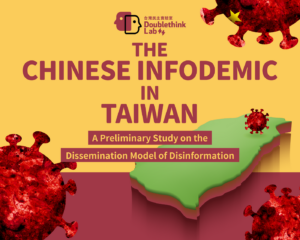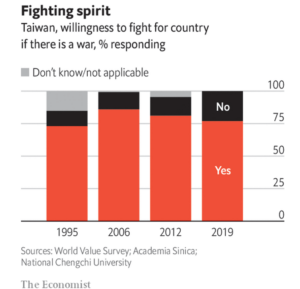 Taiwan is a democracy, so its future lies in its people’s hands. But that makes it vulnerable to authoritarian exploitation, The Economist observes.
Taiwan is a democracy, so its future lies in its people’s hands. But that makes it vulnerable to authoritarian exploitation, The Economist observes.
China is already promoting defeatist and divisive ideas in the Taiwanese media. It is up to the Taiwanese to unite against them. They must decide who they are, what they believe in, whether they will fight and what that might cost, it adds in a Special Report.
China’s Communist Party has been running psychological operations against Taiwan for decades. It tries to affect Taiwanese thinking in two ways: by cultivating businessmen and politicians to support unification, and by sowing defeatism, The Economist adds:
 Taiwan has had more success in strengthening civil society and transparency than in curtailing “red” speech. A flurry of fact-checking organisations post rebuttals to false narratives in the media. One group made a chatbot that could detect false messages and automatically send fact-checks. Taiwan has added online- and media-literacy programmes to public education. It requires government agencies to debunk disinformation on a “222 principle”: responses should be posted within two hours, with 200 words and two images, making official clarifications speedy, clear and easy to share. Ms Tsai’s presidential victory in 2020, with a record 8.2m votes, showed that the strategy worked.
Taiwan has had more success in strengthening civil society and transparency than in curtailing “red” speech. A flurry of fact-checking organisations post rebuttals to false narratives in the media. One group made a chatbot that could detect false messages and automatically send fact-checks. Taiwan has added online- and media-literacy programmes to public education. It requires government agencies to debunk disinformation on a “222 principle”: responses should be posted within two hours, with 200 words and two images, making official clarifications speedy, clear and easy to share. Ms Tsai’s presidential victory in 2020, with a record 8.2m votes, showed that the strategy worked.
Taiwanese society is susceptible because of its authoritarian history, says Lee Ming-che, an activist who returned to Taiwan in 2022 after five years of imprisonment in China. Chinese activists often came to Taiwan to learn how it moved away from one-party authoritarianism. “They thought, and so did we, that Taiwan could show the way forward for China.”
#Taiwan’s leaders know that neither strong democracy nor economic importance is enough. The #Ukraine war has taught them# that a small country bullied by a bigger neighbor must demonstrate that it has the will to resist, says @TheEconomist. https://t.co/mqWCuy9vIy
— Democracy Digest (@demdigest) March 6, 2023







